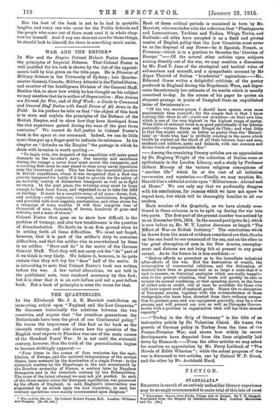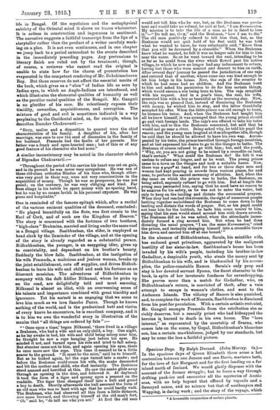FICTION.
SVABNALATA.a READERS in search of an entirely unfamiliar literary experience may be strongly recommended to make trial of this tale of rural
firers/data &ens, from Binds Village Lilo in Bengal. B7 T. N. Gangult Translated from the Bengali by DalahMachuron Boy. Loudon Macmillan and Co. lasl
life in Bengal. Of the mysticism and the metaphysical subtlety of the Oriental mind it shows no traces whatsoever.
It is artless in construction and ingenuous in sentiment.
The narrative suggests a faithful transcript from the lips of a storyteller rather than the product of a writer carefuly work- ing on a plan. It is not even continuous, and in one chapter we jump back to a period antecedent to the events described in the immediately preceding pages. Any pretensions to literary finish are ruled out by the treatment ; though, of course, a reviewer who cannot read the original is unable to state how far the charm of presentation has evaporated in the competent rendering of Mr. Dakshinachamn Roy. But these reserves do not affect the essential merits of the book, which gives us a " slice " of Indian life as seen by Indian eyes, in which no Anglo-Indians are introduced, and which illustrates the elemental qualities of humanity as well as the peculiar racial qualities of the Bengali. Mr. Ganguli is no glorifier of his race. He relentlessly exposes their timidity, cowardice, acquisitiveness, and corruption. The mixture of good and evil is sometimes indicated in a way perplexing to the Occidental mind, as, for example, when he describes Ramdev Chakravarti "Envy, malice and a disposition to quarrel were the chief characteristics of his family. A daughter of his, after her marriage, was sure to sow the seed of dissension in the family of her husband. Pramada had the faults of her parents. Her father was a frank and open-hearted man ; but of this or of any good feature of his character she had none."
A similar inconsistency may be noted in the character sketch of Bipradas Cbakravarti
r- " Throughout the period of his service his heart was set on gain, sad in its pursuit he was never very scrupulous. He was one of these old-class orthodox Hindus of his time who, though other- wise very good in their way, were not very conscientious in the acquisition of money. Though he was so prosperous, he was not proud; on the contrary, he was very obliging and kind. Far from stingy in his habits he spent money with no sparing hand, but ho was by no means lavish in his personal expenses. He was pious and hospitable."
One is reminded of the famous epitaph which, after a recital of the various eminent qualities of the deceased, concluded: " He played beautifully on the flute, was first cousin to the Earl of Cork, and of such are the Kingdom of Heaven." The story is concerned with the fortunes of two brothers, " high-class" Brahmins, married and living under the same roof in a Bengal village. Sasibliushan, the elder, is employed as bead clerk by the Zamindar of the village, and at the opening of the story is already regarded as a substantial person. Bidhubhushan, the younger, is an easygoing idler, given up to conviviality, and dependent on his brother's bounty, Suddenly the blow falls. Sasibhuahan, at the instigation of his wife Pramada, a malicious and jealous woman, breaks up the joint establishment, cuts off supplies, and drives Bidhub- inshan to leave his wife and child and seek his fortune as an itinerant musician. The adventures of Bidhubhushan in company with the daft fiddler Nilkamal, whom be picks up on the road, are delightfully told and most amusing. Nilkamal is almost an idiot, with an overweening sense of his talents and importance combined with great timidity and ignorance. Yet his naieetb is so engaging that we come to love him much as we love Sancho Aura. Though he knows nothing of the world, and is the predestined butt and viotim of every knave he encounters, he is excellent company, and it is to him we owe the wonderful story in illustration of the maxim that " all things are ordered by fate ":— ". Once upon a time,' began Nilkamal, 'there lived in a village a Brahman, who bad a wife and an only child, a boy. One night, as he lay awake in bed, his wife and child being asleep near him, be thought he saw a rope hanging jest before his eyes. He minded it not, and turned upon his side and tried to fall asleep. But slumber came not to him, and again opening his eyes, there he once morn saw the rope. This time it seemed to be a little nearer to the ground- "It must be the mice," said he to himself. But as he looked again, lo! the rope turned into a snake ; and before the Brahman could rouse his wife, the snake descended and bit the mother and child, who died instantly. The Brahman Mood amused and horrified at this. He sass the snake glide away through an opening in the door, and followed it. At daybreak it took the form of a tiger and sprang upon a peasant on the roadside. The tiger then changed iteell into abull and gored A boy to death. Shortly afterwards the bull assumed the form of an old man who was so bent with age that he could hardly walk. The Brahman, who had observed all this from a little distance, now came forward, and throwing himself at the old man's feet, " Oh." said he, "do tell me whe Yon are
At first the old man
would not fell him who he was, but, as the Brahman was persis- tent and would take no refusal, he said at last, I am Karmasutra. My mission is to take the life of a man as he is fated to lose it.".—" Do tell me, then," said the Brahman, "how I am to die." The old man positively refused to tell him that, but, as the Brahman would not quit hold of his feet until he was told what he wanted to know, ho very reluctantly said, "Know then that you will be devoured by a crocodile." When the Bushman knew what he wanted, he felt it was no longer safe for him to live near the water. So on he went toward the east, intending to he as far as he could from the river which flowed past his native village, to which he now no longer bad any inducement to return, having lost those who were nearest and dearest to him on earth. After several days' journey he paused the jurisdiction of one raja and entered that of another, where some one was kind enough to let him lodge in his house. Now, the raja of the country to which he bad some had no children. And the Brahman went to him and asked his permission to do for him certain things, which would ensure a son being born to him. The raja complied with his request. And in a year's time, the rani, his wife, presented him with a boy as beautiful as the morning star. Now, the raja was so pleased that, instead of dismissing the Brahman with money, he wished him to stay, and the latter thankfully accepted his offer. When the little prince was old enough to learn, he became his tutor. And, when the Brahman had taught him all be knew himself, it was arranged that the young prince should go and visit foreign lands. The raja's son offered to take his tutor with him, and to this the Brahman consented, but said that he would not go near a river. Being asked why, he told his pupil the reason; and the young man laughed at it as altogether idle, though he said that he should be allowed to have his own way. Accom- panied by his tutor, the prince travelled through foreign countries, and at last expressed his desire to go to the Ganges to bathe. The Brahman of course refused to go with him ; but, said the youth, " Why, sir, you are not going to be seized by a crocodile on land, that's certain." What could the Brahman do? He felt it was useless to refuse any longer, and so he went. The young prince came to a town on the Ganges and took a suitable boom. Now, there was a yoga. at hand, and for two or three days men and women had kept pouring in crowds from various places, far and near, to perform the sacred ceremony of ablution. And, when the day came on which the prince was to bathe, the Brahman, on being asked, expressly refused to go with him. But at length the young man persuaded him, saying that he need have no reason to be anxious for his safety, as he was not to enter the water, but only to keep on the landing and dictate the ceremonial prayers. When they had reached the riverside, the sight of numerous people bathing together emboldened the Brahman to come down to the landing and dictate the words of prayer. But, as his pupil could not hear him for the hubbub, he bade him come nearer to him, saying that his men would stand around him with drawn swords. The Brahman did as he was asked, when the attendants imme- diately formed a ring around him. But when he had dons dictating the usual prayers, I am the same Karmosutra," cried the prince, and instantly changing himself into a crocodile threw him down and carried him off at one bound.' " In the absence of Bidhubhushan, Barak, his saintlibe wife, has endured great privations, aggravated by the malignant hostility of her sister-in-law. Saaibbushan's house has been invaded by his wife's people, including his brother-in-law Gadadher, a despicable youth, who steals the money sent by Bidhubhushan to hie wife, and is blackmailed by his accom- plice, the police.conatable lames. Sarala's only prop and stay is her devoted servant Syama, the finest character in the book, in spite of her inveterate fondness for eavesdropping. She proves more than a match for Gadadliar, who, on Bidhubleashan's return, is convicted of theft, after a vain attempt to escape in woman's clothes, and sent to the Andaman Islands. The villainy of lames is also punished, and, to complete the work of Nemesis, Saaibhushan is dismissed from his post for peculation. With a certain artistic restraint, Mr. Ganguli exempts Pramada from the retribution she an richly deserves, but a rascally priest who had kidnapped the heroine is burned to death in his own house. The "love interest," as represented by the courtship of Svarna, who comes late on the scene, by Gopal, Bidhnbhushan's blameless son, has a certain mawkishness, judged by our standards, but may be none the lees a faithful picture.



































 Previous page
Previous page